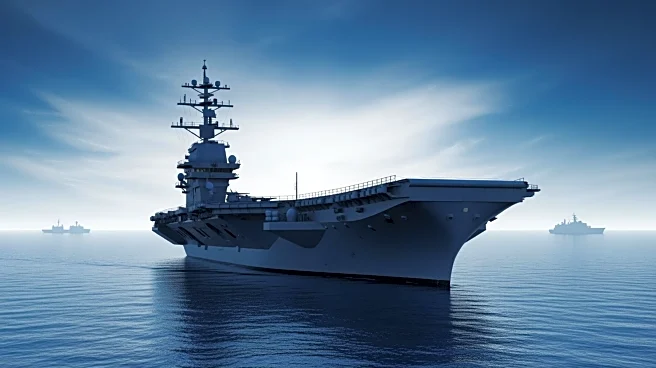What's Happening?
China has officially commissioned its third aircraft carrier, the Fujian, marking a significant step in its naval modernization efforts. Constructed at the Shanghai Jiangnan Shipyard and launched in 2022, the Fujian is an 80,000-ton vessel equipped with
advanced catapult-launch capabilities. This development enhances China's naval aviation capabilities, allowing for the deployment of heavier payloads and larger aircraft, such as the J-35 stealth fighters and KJ-600 early warning aircraft. The commissioning ceremony, attended by Chinese President Xi Jinping, showcased the carrier's electromagnetic catapult and aircraft management operations. The Fujian's deployment is part of China's broader strategy to assert its military presence in the Indo-Pacific region, amid increasing tensions with the United States over Taiwan.
Why It's Important?
The commissioning of the Fujian aircraft carrier is a pivotal moment in China's military expansion, potentially altering the balance of power in the Indo-Pacific region. With enhanced naval capabilities, China can project its military influence further into the Pacific, challenging U.S. presence and its allies' security interests. This move could escalate tensions between Washington and Beijing, particularly concerning Taiwan, where China's military ambitions are a point of contention. The Fujian's advanced technology, including electromagnetic catapults, positions China to compete more effectively with U.S. carriers, although reports suggest it may not match the operational efficiency of American Nimitz and Ford-class carriers. The development underscores the strategic importance of naval power in regional security dynamics.
What's Next?
China's naval expansion is likely to prompt responses from regional powers and the United States. The U.S. Navy may increase its presence in the Indo-Pacific, conducting more joint exercises with allies to counterbalance China's growing capabilities. Additionally, countries like India, Japan, and South Korea are advancing their own naval aviation programs, potentially leading to an arms race in the region. Diplomatic efforts to manage tensions and prevent conflict over Taiwan and other strategic areas may intensify. The Fujian's operational deployment will be closely monitored by international observers, assessing its impact on regional security and geopolitical stability.
Beyond the Headlines
The commissioning of the Fujian aircraft carrier highlights broader geopolitical shifts, with China asserting its role as a dominant maritime power. This development raises ethical and strategic questions about military expansion and its implications for global peace. The increased militarization of the Indo-Pacific could lead to heightened risks of confrontation, necessitating robust diplomatic channels to mitigate potential conflicts. Furthermore, China's naval advancements may influence global naval strategies, prompting other nations to reassess their defense policies and alliances.















